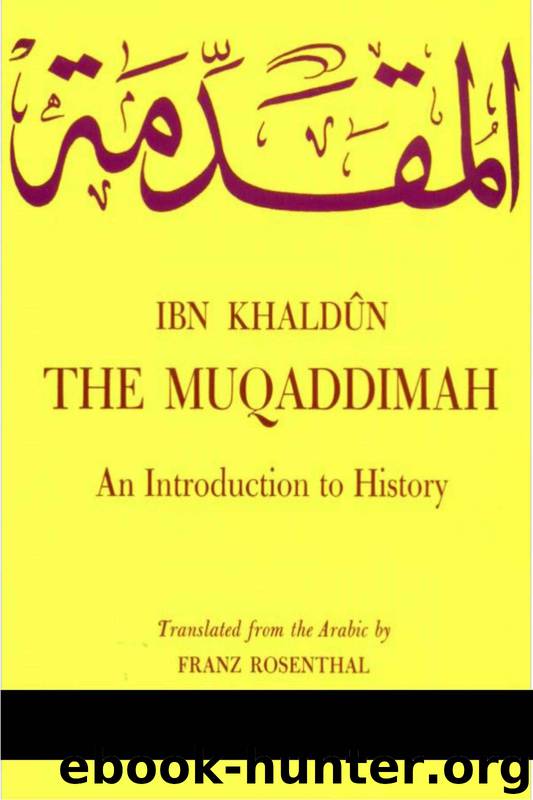The MUQADDIMAH : An Introduction to History by Ibn Khaldun

Author:Ibn Khaldun [Khaldun, Ibn]
Language: eng
Format: epub
Tags: History
Publisher: OLIVE PRESS
Published: 2014-10-14T04:00:00+00:00
application of the word fard'id to a particular discipline, or its restriction to estate division, is part of the technical terminology the jurists created when the various disciplines and terminologies came into existence. At the beginning of Islam, the word (fard'id) was used only in a general way. It was derived from fard, which means "to determine" or "to cut." 262a It was intended to be used for all the furud "obligations," as we have stated. Such was its actual use in the religious law. (In interpreting the tradition quoted,) the word must not be taken to mean anything but what it meant at the time of the (early Muslims). That indicates most correctly what they meant by it. And God knows better. 13. The science of the principles of jurisprudence and its subdivisions, dialectics and controversial questions. 263 It should be known that the science of the principles of jurisprudence is one of the greatest, most important, and most useful disciplines of the religious law. It is concerned with the evidence of the religious law from which the laws and legal obligations of the Muslims are derived. The basic sources of legal evidence are the Book -that is, the Qur'an - and, then, the Sunnah, which clarifies the Qur'an. At the time of the Prophet, the laws were received (directly) from him. He possessed the Qur'anic revelation, and he explained it directly by his words and deeds. No transmission, speculation, or analogical reasoning was needed. After the Prophet's death, direct (explanation of the Qur'an's legal significance) was no longer possible. The Qur'an was preserved through a general and continuous transmission. As to the Sunnah, the men around Muhammad all agreed that it is necessary for us to act in accordance with whatever of it has reached us, as statement or practice, through a sound tradition that can be assumed to be truthful. It is in this sense that legal evidence is determined by Qur'an and Sunnah. Then, general consensus (ijma') took its place next to (Qur'an and Sunnah). The men around Muhammad agreed to disapprove of those who held opinions different from theirs. They would not have done that without some basis for doing so, because people like the men around Muhammad do not agree upon something without a valid argument. In addition, the evidence attests the infallibility of the whole group. Thus, general consensus became a valid proof in legal matters. Then, we looked into the methods according to which the men around Muhammad and the early generations made their deductions from Qur'an and Sunnah. It was found that they compared similar (cases) and drew conclusions from analogy, in that they either all agreed or some of them made concessions in this connection to others. Many of the things that happened after the Prophet are not included in the established texts 264 Therefore, they compared and combined them with the established indications that are found in the texts, (and drew their conclusions from analogy) according to certain rules that governed their combinations.
Download
This site does not store any files on its server. We only index and link to content provided by other sites. Please contact the content providers to delete copyright contents if any and email us, we'll remove relevant links or contents immediately.
| Buddhism | Christianity |
| Ethnic & Tribal | General |
| Hinduism | Islam |
| Judaism | New Age, Mythology & Occult |
| Religion, Politics & State |
Cecilia; Or, Memoirs of an Heiress — Volume 1 by Fanny Burney(31339)
Cecilia; Or, Memoirs of an Heiress — Volume 3 by Fanny Burney(30936)
Cecilia; Or, Memoirs of an Heiress — Volume 2 by Fanny Burney(30891)
The Secret History by Donna Tartt(16635)
Sapiens: A Brief History of Humankind by Yuval Noah Harari(13060)
Leonardo da Vinci by Walter Isaacson(11907)
The Radium Girls by Kate Moore(10910)
Sapiens by Yuval Noah Harari(4541)
The Wind in My Hair by Masih Alinejad(4426)
How Democracies Die by Steven Levitsky & Daniel Ziblatt(4401)
Homo Deus: A Brief History of Tomorrow by Yuval Noah Harari(4282)
Endurance: Shackleton's Incredible Voyage by Alfred Lansing(3845)
The Silk Roads by Peter Frankopan(3764)
Man's Search for Meaning by Viktor Frankl(3637)
Millionaire: The Philanderer, Gambler, and Duelist Who Invented Modern Finance by Janet Gleeson(3572)
The Rape of Nanking by Iris Chang(3518)
Hitler in Los Angeles by Steven J. Ross(3440)
The Motorcycle Diaries by Ernesto Che Guevara(3338)
Joan of Arc by Mary Gordon(3260)
